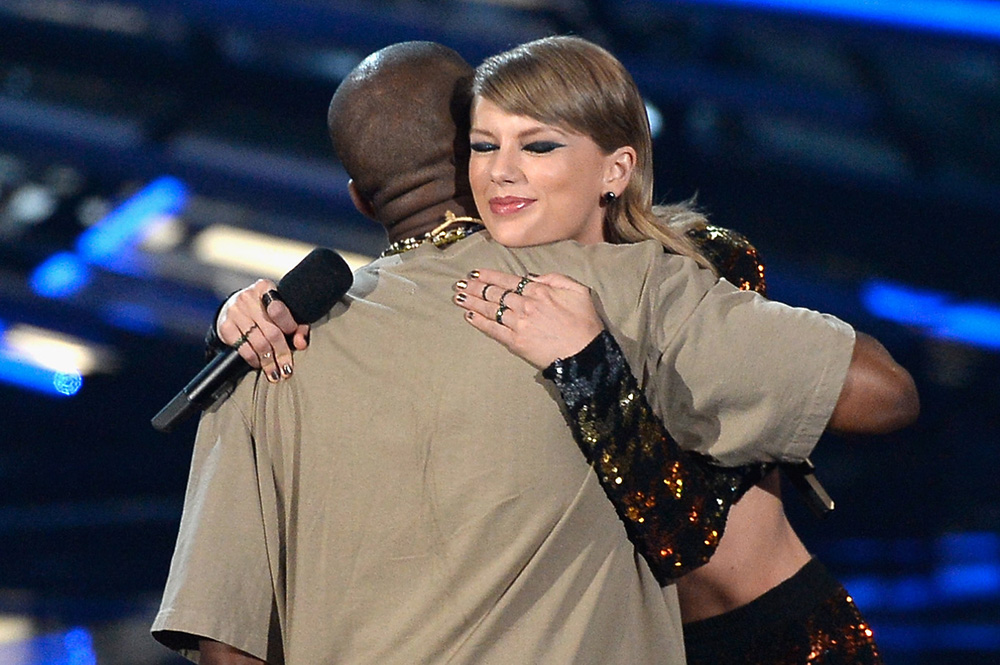No moment could have summed up the 2015 MTV Video Music Awards better than Taylor Swift handing a lifetime achievement award to Kanye West. It was everything: Two of the biggest stars of the 21st century, consummating a moment collectively wished for and joked about by the Internet since West was announced as this year’s Video Vanguard recipient, allowing both stars a moment to achieve closure on one of the most infamous incidents in recent pop music. It had hype, heft, and history. And it ended with the most exciting declaration of presidential intent since Barack Obama.
If you were to watch a Video Music Awards ceremony from the mid-’00s today, you might be stunned at how unrecognizable it feels from the show that transpired last night. Take the nadir of 2006, whose host was a past-his-peak Jack Black, whose Video Vanguard award went to an actual video director, whose big winners were Panic! At the Disco and James Blunt, and whose big celebrity cameo was from Al Gore. Unsurprisingly, the show — almost entirely lacking in star power, unforgettable moments, or even particularly good videos — drew its worst rating in years. The drought of relevance during the mid-’00s led to an identity crisis for the VMAs, which in ’07 resulted in MTV attempting to entirely reinvent their biggest night: eliminating most of their signature award categories, dramatically paring down the number of performances, and staging the event more as one long, celebrity-filled party than any kind of proper ceremony.
The backlash to the makeover was immense, and the VMAs mostly reverted to form the next year. But it wasn’t until the 2009 ceremonies that the Video Music Awards figured out their true 21st-century identity, with one particularly sweeping moment of revelation: Taylor Swift’s aw-shucks acceptance of her first-ever Moonman (for Best Female Video), interrupted by Kanye West in a drunken bout of meritocratic self-righteousness. You could say that Taylor and Kanye rescued the VMAs, but really, it was Twitter that was MTV’s savior: ‘Ye’s inexplicable stage-crash was one of the Bluebird’s first truly great communal moments, where countless fans across the globe reached out to one another in an attempt to make sense of what the hell just happened. (The fact that Kanye’s “Imma let you finish” quote could instantly be Silly-Puttied into a thousand different memes didn’t hurt, either.) The experience was just as memorable for the way it was shared on social media after the fact, as it was for the visceral shock it caused in real time.

Also Read
Choppered and Tuned
It was telling that the Taylor-Kanye moment was imprinted so firmly on the 2015 ceremonies — to the point where Kanye even called out MTV while onstage, lambasting the channel for endlessly replaying Swiftgate during interstitial pauses in last night’s action. This was, after all, the year where MTV fully embraced the VMAs’ modern identity: a show whose primary purpose was not to award the biggest and best videos of the year (or even the artists behind them), or to round up performances by the biggest names in pop music. It’s a show whose number-one goal is to give the Internet things to talk about, to inspire trending topics and fan wars, thinkpieces and debates of morality and decency — essentially to have moments no one will want to miss for fear of not being able to argue about them the next day.
Now, of course, this is hardly brand-new stuff for MTV — the VMAs have been in the business of generating insta-controversy for decades, dating back to Madonna writhing around in a wedding dress in the very first ceremonies. But never before has the channel been so craven in its bet-hedging. Last night’s awards came pre-packaged with its own set of narratives — feuds established in the weeks leading up to the awards, that MTV may or may not have had a hand in originally propagating, but for which they definitely provided the stage to be properly played out. And in case that wasn’t enough, the show provided innumerous callbacks to the two most explosive moments of the awards’ previous decade: the ’09 stage-crash, and the 2013 “Blurred Lines” performance that turned Miley Cyrus into the most polarizing 21-year-old in America.
Regardless of how her MTV hosting debut was actually received — not brilliantly, it turns out — Cyrus was an inspired choice for the VMAs’ first proper host in three years, because she was all but guaranteed to set the wheels in motion for any number of viral moments. Undoubtedly to the channel’s delight, she started before the show did, criticizing the Twitter reponse of Nicki Minaj over being snubbed for Video of the Year in a New York Times interview the previous week. Minaj was unsurprisingly given the proper platform to rebut, first in a show-opening performance (which saw her resolving her own quasi-beef with Taylor Swift) and then after a vindicating win for Best Hip-Hop Video. “And now, back to… this bitch that had a lot to say about me the other day in the press,” Minaj capped her acceptance speech, shooting daggers at the show’s host. “Miley, what’s good?”
Miley demurred in response to Nicki — alluding to her quote getting taken out of context — and kept the line moving, because she had plenty of her own trending topics waiting to get through: countless drug jokes, outré costumes, and references to her bad-as-she-wanted-to-be performance with Robin Thicke a few years earlier. And then there was the climactic number, a psychedelic, phallic, Wayne Coyne and RuPaul’s Drag Race-assisted performance of raucous new song “Dooo It!,” ending with Cyrus’ announcement of (you guessed it, probably) a free new album of hers currently available on her website. Cyrus’ stream of #content was so relentlessness throughout the night that you might have even noticed or cared that she had a nipple slip late in the proceedings — even though Miley herself referenced it on air — whereas during one of the less-eventful ceremonies of the mid-’00s, such a happening would’ve stopped the world on its axis.
Of course, as much as Miley domineered the proceedings, the events of the night still most orbited around Taylor Swift. The unquestioned World’s Biggest Pop Star was at the heart of everything, making nice with Nicki Minaj, introducing Kanye West, hanging with Kim Kardashian, and winning so many Moonmen that she occasionally had to be reminded which award she was accepting. The most self-possessed pop star of her era — and certainly the one who best understands the art and importance of fan service — Taylor is the ideal paragon of the modern 21st-century VMAs, a mass-culture figure who knows how to create headlines without diminishing her own brand, who can play dirty when the moment calls for it but never seems to have any trouble getting clean afterwards.
Her flipside, of course, is West, an artist with just as universal recognition and just as great potential for high drama as Swift, but for totally different reasons. As much as Taylor’s most unseemly moments still feel like they were plotted ten moves ahead, Kanye’s Internet-immolating talking points seem the product of spontaneous inspiration — beautifully exemplified by Taylor’s note-perfect, near-cloying introduction for West as the Video Vanguard recipient, and Kanye’s ensuing stoned, rambling, highly digressive but sporadically transcendent 13-minute acceptance speech.
The endless ovation Kanye received before his speech — welcoming him as something of a conquering hero, despite the fact that his video presence on MTV has never been that overwhelming, and in the last 12 months has been particularly minimal — felt strange, but it made sense more within the lens of Kanye’s history as a vanguard of the Video Music Awards than of music video in general. His zig-zagging address of award-show injustice, personal triumph over adversity and misperception, and trusting the kids to speak the truth was yet another iconic VMAs moment for West in a career full of them. He even did the Internet the favor of ending his not-easily-summarized missive with a aggregator-friendly, mic-drop climax: “I have decided in 2020 to run for president.”
The core differences between Kanye and Taylor have always made their alliance an awkward one — since 2009, no interaction between the two has ever felt natural, including their uncomfortable embrace on stage last night — but both are necessary as the yin and yang of the ’10s VMAs. MTV needs both Taylor’s contained, predictable, reliable professionalism at engaging in high-profile celebrity pettiness, and Kanye’s significantly more volatile predilection for swinging big and wildly, hitting moonshots and/or striking out entirely. Getting the two of them together is about as surefire a recipe as MTV has for producing this kind of water cooler-worthy content in between the awards and performances, and it’s gonna be tough for MTV to resist the temptation to do so again in future years — especially once we start hitting round-number anniversary years for 2009.
The most revealing moment in Kanye’s speech came with him yelping, “I don’t understand award shows!,” explaining that he couldn’t fathom why shows like the VMAs would reward pop’s most successful artists by making the majority of them feel like losers. It was a thought-provoking point, but in making it, Kanye proved himself right: He doesn’t understand award shows. The winners and losers at these ceremonies aren’t determined by who actually takes home the trophies anymore, but by who people are still talking about on the Internet the next day. It’s more Slam Dunk Contest than All-Star Game, with the biggest artists freestyling their most flamboyant moves on stage and the fans at home holding up their scorecards in judgment. And so, while Taylor essentially swept the awards, it’s her White House-hopeful counterpart who really won the night, and MTV who may be the biggest victors of all, having officially realized the VMAs’ social media-age potential as the awards show that celebrates itself.




